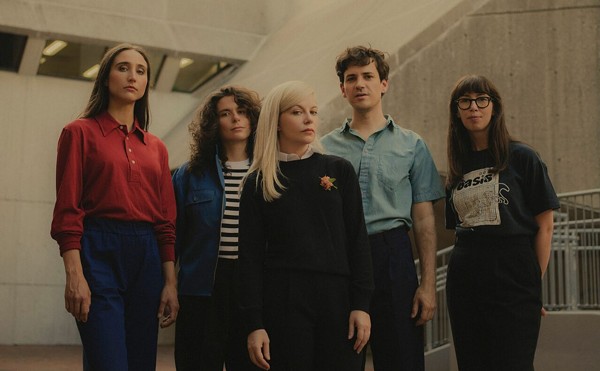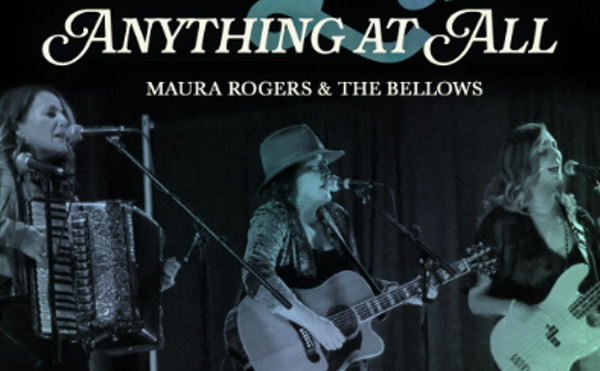It's been a crazy and eventful four years since Los Lonely Boys were catapulted from the security of their rabid fan base in Austin, Texas, to a largely receptive world audience after the major-label reissue of their eponymous debut album. With their Epic contract, the brothers Garza (Henry on guitar, JoJo on bass, Ringo on drums) became platinum artists on the strength of their massively successful single "Heaven" and the relentless touring that has become their hallmark.
But like so many before them, the Boys' 2006 sophomore album, Sacred, didn't quite live up to the label's expectations, which isn't surprising since it didn't quite meet the band's expectations either.
"Because of the success of the first one, by the time the label was ready for another one, we weren't ready," says Henry Garza via phone from Los Lonely Boys' Washington, D.C. tour stop. "Music's gotta come out when you live. It's not coming out with a new product line. It's not like making a bunch of Chips Ahoy cookies. It was still our stuff, but we still felt it was a little rushed."
For their third album, the Boys decided to shake things up and try a slightly different approach to their recording process. Although they recorded relatively quickly in the studio, the trio worked longer and more diligently on the songs that they took into the studio - something that didn't happen with Sacred.
"We did it in one day shy of three weeks," says Garza. "It was recorded live, we worked with a different producer - Steve Jordan - and the process was real fun. We had it set up like we were doing a live show somewhere - a small set of drums, a twin and a little bass amp - and we recorded like that on some of the songs. It came across good."
Part of the Boys' strategy was not actually having a strategy. Putting the reins in Jordan's hands, the Garzas went into the sessions with a handful of songs ready to record and little idea how the actual work would play out. "I can't say I was fully prepared for what was going to happen in there," says Garza. "We'd talked with Steve a little bit and told him we're a live band, and to be able to capture that in the studio is kind of tough. It's a feeling and a spontaneous moment in that response you get from people that you're feeding off of. Nothing can prepare you for what you don't know in the studio, but the vibe was really good."
Los Lonely Boys' rawer, more immediate approach in the studio yielded Forgiven, the trio's grittiest and perhaps best album to date. As with the first two (as well as their 2005 live album), the Garzas' familial bond was the natural catalyst for their musical fireworks, but with Forgiven, even Jordan was an honorary bro by the time the sessions wrapped. "It was like a big family. When Steve Jordan left there, he wasn't Jordan anymore - he was Steve Garza," says Garza with a laugh. "The music was coming out of us fluently."
The inspirations for Forgiven were likely coming from the amazing experiences that transpired in the three years after the Epic distribution of their first album. Double platinum sales, the Best New Artist Grammy, whirlwind tours and their subsequent live album helped tee up Sacred, while recording with Carlos Santana for his All That I Am album and contributing "Whatever Gets You Through the Night" to last year's John Lennon tribute/Darfur benefit album were the defining moments leading up to Forgiven. The spontaneous nature of Los Lonely Boys' live presentation was clearly a component of Forgiven's recording process, but it also came through in the band's writing sessions.
"This one definitely has that 'brothers' feel," says Garza. "It's that simple formula: Less is more. We're just keeping it back to the roots. Like when 'Heart Won't Tell a Lie' was written, I didn't think we'd ever record it or even do it, because it was just something that came out. All the songs on there are close to our hearts, they're like our children, because they come from us."
The inclusion of the Boys' cover of the 1966 Spencer Davis Group song "I'm a Man" is a case of spontaneity in the studio. As Jordan was setting up for a next take, the Garzas started vamping on an instrumental riff that they'd tossed around during the writing phase. At one point in the jam, it occurred to the trio almost intuitively that they were channeling the 40-year-old single, and Henry began singing the familiar chorus ("I'm a man, yes I am, and I can't help but love you so ..."), triggering an unexpected response from Jordan.
"Steve's eyes got as big as golf balls," says Garza with a laugh. "Apparently, the night before he'd been wanting to pitch a cover for us to do, and that was the song that he was going to pitch and he was just freaking out! We considered it a good omen and rolled with it. It wasn't something we planned. We'd never even played it before, for that matter. We learned it a little bit live, and what you hear is what we did."
From the label's serendipitous choice of Jordan for producer to the accidental take on "I'm a Man" to the album's cover art depicting a personalized version of the Mayan calendar, there's a great deal about Forgiven that almost feels as though the Garzas were led to this spot by unseen forces. It's a feeling that isn't lost on the band.
"It's weird how it all came together," says Garza. "We didn't know anything about the Mayan calendar. We started hearing about what it meant, and we saw it in the new Indiana Jones movie. Then we saw it on the History Channel, and we were like, 'We tapped into some kind of universal wave we didn't know about.' Not to sound like lunatics or nothing, but we're spiritual believers in the good Lord Jesus Christ. We're not perfect and we're not churchgoers by any means, but we're believers."
While Sacred fell far short of the double-platinum figures of the first album, Los Lonely Boys really didn't think about that when they recorded Forgiven. For the Garzas, the end result is the most important thing, and they are exceedingly happy with their album - and for all the right reasons.
"What we feel is no different than what anybody else feels," says Garza. "That's the connection with the songs and the music: People can relate to it in one way or another. That's the key. We want to target the human spirit, not just a certain group or race of people. Just because we're Mexican, we don't want to target just Mexican people. The human spirit can make you cry and laugh and jump and dance. It's magical, man, and something that nothing in this world can replicate. It's a gift, and like anything else in this world, it comes with great responsibility. Everything influences the world, and music is a big part of that because it's a universal language. We're just trying to be as humble and as real as we can be through all this make-believe stuff we create. We're family first, and music is just a blessing on top of that."













